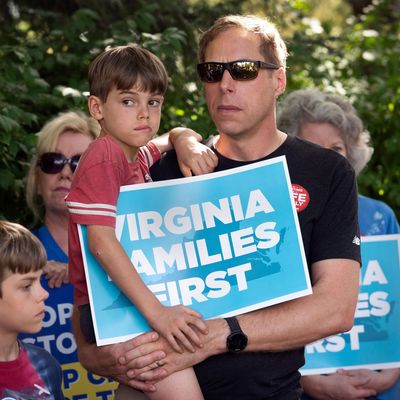
There is no question that Glenn Youngkin’s victory over Terry McAuliffe in the Virginia gubernatorial race will generate copy-cat campaign tactics among Republicans all over the country going into the 2022 midterms. And among those tactics will most definitely be the “parental rights” messaging that was deployed to take advantage of all sorts of current grievances toward public schools, ranging from pandemic policies to the usual complaints about “woke” curriculum to the very existence of “government schools.”
But the “parents matter” crusade in Virginia raises some deeper issues about public education’s very purpose. Yes, of course, many parents were justifiably upset about being asked to assist schools in educating their kids when the pandemic shut down in-person instruction. The perception that teachers, administrators, school board members, and other elements of the “educational bureaucracy” want parents to support their decisions without being given much opportunity to shape them is too widespread to be entirely contrived or ideologically driven. And there are preexisting tensions involving anti-teachers-union sentiment at play as well.
On the other hand, if parental involvement in school decision-making turns into parental control, as many conservatives implicitly or explicitly advocate, the fundamental question that must be asked is whether education is a public good in which the citizenry at large is the essential stakeholder, or a publicly provided private benefit for children and their parents — like, say, SNAP or school-lunch programs. If it’s the former, then whatever input parents are offered, the elected or appointed public authorities should ultimately call the shots. If it’s the latter, then it does make sense to replace traditional public accountability measures like mandatory academic standards and anti-discrimination policies with maximum deference for the wishes of parents. That position takes you right down the road, of course, to “backpack vouchers” (strapped to the student wherever she goes), in which the lion’s share of education funding bypasses the school authorities and goes directly to the child for its use in any educational setting parents choose.
In a system of public schools conceived as providing for an educated future citizenry, teachers and administrators are public servants with roles and responsibilities in the system that transcend showing up, clocking in, performing specified tasks, and clocking out. In a system of public schools conceived as a taxpayer-financed service for children and parents, administrators and teachers are employees only, with whatever privileges and pay they can wrangle from “the boss,” the parents of the kids in the classroom. The parent who chooses to homeschool children, or to send them to private schools with a primarily religious mission, owes nothing to the public schools they abandon.
Meanwhile, non-parents (or those with grown children) may begin to think of education funding as strictly an income-transfer program that they may support in principle, but not with any sort of personal buy-in. That doesn’t necessarily mean a steadily downward trajectory of education funding; after all, higher education is essentially set up as an income-transfer program from taxpayers to parents and students in which a big chunk of the population does not directly benefit (though we do expect students and parents to pay ever-higher tuition and fees, which would be horrifying if applied to K-12 schools). But the idea of public schools as central to the American experience, and reflecting egalitarian and even communitarian values, would not long survive. Parents who want to control all aspects of their kids’ educational journey, and the politicians who cater to them, should be aware of the long-term cost.






























